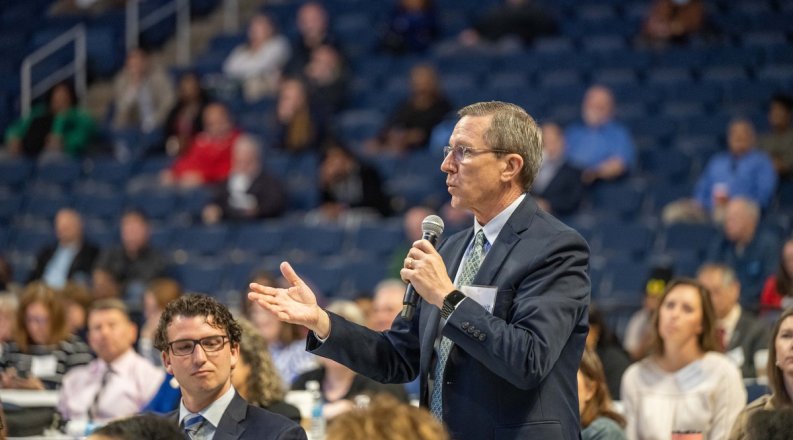Approximately 700 stakeholders from across Old Dominion University gathered in Chartway Arena on April 26 to participate in the inaugural Budget Summit. Students, faculty, staff and administrators were invited to brainstorm opportunities for innovation, efficiencies and revenue generation with the goal of making higher education at ODU equitable, affordable and transformative.
In his opening remarks, President Brian O. Hemphill, Ph.D., explained that adapting in a rapidly changing industry requires ideas and perspectives from across the University. “When we think about the landscape of higher education, it is changing right before our eyes. Higher education is operating in an industrial model in a post-industrial society, and the level of federal and state funding continues to fluctuate,” he said.
Higher education institutions are also grappling with high levels of student debt and anticipated declines in enrollment based on population changes.
“All of these factors are creating significant questions from our citizens around the value of higher education, and we know they are asking the question – is it truly worth the cost?” President Hemphill said. “Our reality is that universities that are willing to adapt to the learners of today and the learners of tomorrow will truly be the institutions that will prosper for the future.”
President Hemphill charged those assembled to envision how ODU could evolve and remain on the cutting edge. “We must think outside the proverbial box,” he said. “By working together, I truly believe there’s no limit to what we have the ability to achieve and accomplish.”
The event began with an open session featuring presentations on the state budgeting process from Aimie Gindi, associate director of the Virginia Department of Planning and Budget, and the University budgeting process from Chad A. Reed, vice president for administration and finance and chief financial officer.
“We must think outside the proverbial box,” President Hemphill said. “By working together, I truly believe there’s no limit to what we have the ability to achieve and accomplish.”
Vice President Reed shared how the University allocates resources, noting the bulk of expense supports instruction. He set forth the key objective for those assembled: leverage the summit to collaboratively inform both the internal budget process and six-year plan the University will submit to the state on July 15.
Participants broke into 12 groups focused on innovation, efficiencies and revenue generation, sharing their findings with all attendees in the afternoon. Representatives presented strategies, ranging from embracing artificial intelligence, or AI, to incentivizing shared investment in systems and reassessing grading methodologies.
Presenting on behalf of a breakout group, Interim Associate Vice President for Finance and University Comptroller Maggie Libby celebrated the spirit of the event, saying, “In my 11 years with the University, I’ve never had the opportunity to talk to so many people from different parts of campus.”
A final report summarizing the presentations will be distributed to campus in mid-June.



